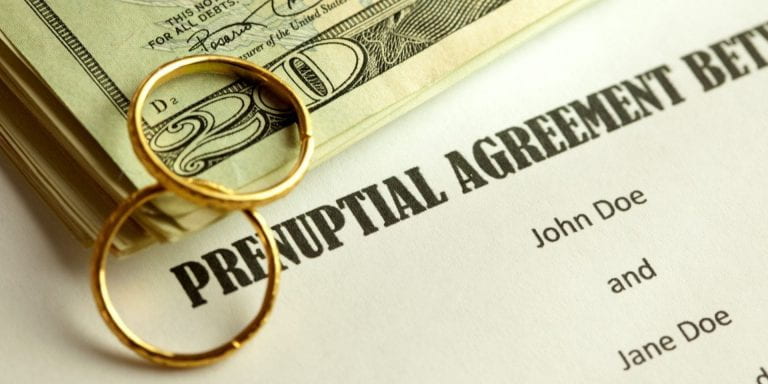By: Allison Grady
 By now, this fact is almost common knowledge, but it is worth repeating- roughly 50% of U.S. marriages end in divorce. And with stay-at-home orders forcing already disgruntled couples to hunker down together, many couples have begun filing. Yet, many people got married without preparing for the possibility of a divorce. For business owners, failing to prepare your business for unexpected life events can cause significant issues down the line. Below is information on how marital assets are split in Pennsylvania, and how business owners can protect their businesses ahead of time through marital and operating agreements.
By now, this fact is almost common knowledge, but it is worth repeating- roughly 50% of U.S. marriages end in divorce. And with stay-at-home orders forcing already disgruntled couples to hunker down together, many couples have begun filing. Yet, many people got married without preparing for the possibility of a divorce. For business owners, failing to prepare your business for unexpected life events can cause significant issues down the line. Below is information on how marital assets are split in Pennsylvania, and how business owners can protect their businesses ahead of time through marital and operating agreements.
what is marital property and equitable distribution?
Like most states, when couples get divorced in Pennsylvania, their assets are split equitably. “Equitable distribution” means that each party receives a percentage of the marital property that the court considers to be fair. So, in situations where one spouse has a job that produces income, and the other spouse provides domestic work (like cooking, cleaning, and childcare) without an income, the spouse who provides domestic work is entitled to part of the other spouse’s income upon divorce. This situation describes a partnership theory of marriage, where both spouses contribute valuable work to the marriage, whether or not they produce an income.
Anything obtained during marriage until the date of divorce is marital property, except for a few specific situations. If you started a business during your marriage, the business itself is considered “marital property,” meaning that your interest in the business belongs to your marriage and is subject to equitable distribution.
Even if you started your business before you were married, your actions after getting married could make the business marital property. Actions, like putting your business capital in a joint bank account, or acquiring a loan with your spouse’s name on it, can entitle your soon-to-be former spouse to part of your business’s assets. Additionally, any income you earn through your business during the marriage is marital property.
Your business is probably the largest asset of your marital property, and also probably the most difficult to turn into cash to be divided. Issues may arise for your business when assets are divided equitably upon divorce. Some of these issues can be avoided by planning ahead.
planning your marriage around your assets
 A prenuptial agreement is a binding contract that marrying couples enter into before they get married. The agreement would address each spouse’s property rights if they were to get divorced. Even though about half of American marriages end in divorce, only 5% of married couples have a prenuptial agreement. This low percentage might be because people do not believe that they will ever get divorced, or even if they do, their partner will not take from their personal property. Even though people hope their marriage will last forever, it is best to plan in case that doesn’t happen.
A prenuptial agreement is a binding contract that marrying couples enter into before they get married. The agreement would address each spouse’s property rights if they were to get divorced. Even though about half of American marriages end in divorce, only 5% of married couples have a prenuptial agreement. This low percentage might be because people do not believe that they will ever get divorced, or even if they do, their partner will not take from their personal property. Even though people hope their marriage will last forever, it is best to plan in case that doesn’t happen.
Your prenuptial agreement can include provisions that limit your spouse’s entitlement to your individual business ventures during the marriage. You must fully and fairly disclose your financial position to your spouse before entering into the agreement for it to be valid. If you materially misrepresent your finances, your spouse can challenge the enforcement of the agreement. If your spouse is successful, he or she may take an equitable share of your business and other property. If you got married without a prenuptial agreement, you and your spouse could enter into a postnuptial agreement after getting married to achieve the same goal.
planning your business around a potential divorce
You can also plan your business anticipating major life events, including a potential divorce. The best practice is to utilize both marital and operating agreements to protect your business. As I have mentioned, your business is probably your most valuable marital asset, and the hardest to turn into cash. If you do not have enough personal cash on hand or the ability to take out a loan to pay your former spouse their share, it can affect your business operations.
Your operating agreement, regardless of the business entity form, can affect your property distribution. Courts often find it difficult to determine the value of the business when dividing it for divorcing couples. In Pennsylvania, the court usually values the business for its marital value, rather than its fair market value.
In a 1990 Pennsylvania Supreme Court case, McCabe v. McCabe, the Court stated that lower courts need to view a partnership agreement as “the preeminent factor in valuing a partner’s rights” in equitable distribution. In this case, the Husband’s partnership agreement (between the Husband and his law firm) contained provisions preventing a partner from ending the firm and selling its assets. Partners were also limited in receiving their share of firm profits. Considering that the husband was unable to receive the full value of his partnership interest, the court reduced his partnership interest to what he would be able to receive to distribute to his ex-wife. This decision reduced the husband’s interest upon divorce from $286,000 to $18,900 for equitable distribution. According to this decision, an operating agreement that limits a partner’s right to liquidate the partnership can make a huge difference in the amount valued at divorce. If your business’s operating agreement does not limit a partner or member’s ability to liquidate the business, the court may force you to sell your business property to pay out an ex-spouse, which will seriously impact business operations.
Consult a lawyer
You should always consult a lawyer before entering into an agreement to ensure that it is enforceable and executed properly.
This post has been reproduced with the author’s permission. It was originally authored February 10, 2020, and can be found here.
 Allison Grady, at the time of this post, is a 3L at Penn State’s Dickinson Law. She grew up in Freehold, NJ, and always knew that she wanted to be a lawyer. Her parents owned a small business when she was in high school, and she helped with some of their marketing in her free time, which sparked an interest in small business operations. Upon graduation, Allison will be working for a public interest organization to assist underprivileged individuals with their civil legal needs.
Allison Grady, at the time of this post, is a 3L at Penn State’s Dickinson Law. She grew up in Freehold, NJ, and always knew that she wanted to be a lawyer. Her parents owned a small business when she was in high school, and she helped with some of their marketing in her free time, which sparked an interest in small business operations. Upon graduation, Allison will be working for a public interest organization to assist underprivileged individuals with their civil legal needs.
Sources
Divorce Image- https://www.moneycrashers.com/filing-taxes-after-divorce-tax-implications/
equitable distribution image- https://burrowsatlaw.com/2018/06/dividing-marital-property/
Prenuptial agreement image- https://www.weinbergerlawgroup.com/relationship-agreements/prenuptial/
Partnership Agreement Image- https://raichattorneys.com/important-nevada-llc-operating-agreement-clauses
Erin D. Hollis, Divorce and the Owner of the Closely Held Business,38- Feb PALAW 42.
Buckl v. Buckl, 542 A.2d 65 (Pa. Super. 1988).
23 Pa.C.S.A. §3501.
Berry v. Berry, 898 A.2d 1100 (Pa. Super. 2006).
Steven L. Fritsch, Prenuptial Agreement Statistics. Dec 7, 2018. https://www.oceansidedivorcelawfirm.com/prenup/prenuptial-agreement-statistics/
Porreco v. Porreco, 811 A.2d 566 (Pa. 2002).
McCabe v. McCabe, 575 A.2d 87 (Pa. 1990).
